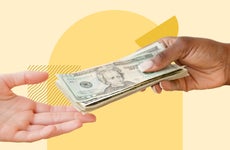What you need to know about payday loans

The Bankrate promise
At Bankrate we strive to help you make smarter financial decisions. While we adhere to strict , this post may contain references to products from our partners. Here's an explanation for .
Key takeaways
- Payday loans are small loans with high fees that typically have to be paid off in 14 days.
- People typically choose payday loans because they’re easy to qualify for and funds are available quickly.
- Many states restrict or ban payday loans because they can lead to severe financial problems if they aren’t paid off on time.
Payday loans are unsecured personal loans that allow you to borrow a portion of your paycheck before receiving it. They can be tempting if you urgently need money before your next pay period. However, the fast payoff period doesn’t leave you much time to adjust for the unexpected. As a result, many payday borrowers often roll over payday loan balances they couldn’t repay, and end up in worse financial shape.
Despite consistent warnings about the APRs that range between 115 and 650 percent or more, consumers often turn to them because they can be funded quickly and easily. It’s critical to understand how they work and find alternatives, so you don’t end up in an endless cycle of payday loan rollovers.
What are payday loans and how do they work?
Payday loans are small loans — usually $500 or less — that are approved based on how much and how often you’re paid. They’re called “payday” loans because the entire loan balance is usually repaid from your paycheck on your next payday, or within 10 to 14 days of taking it out. Payday loans are a type of no-credit check loan that typically only require proof of your paycheck for approval. That makes them a common choice for borrowers with bad credit.
Funds are usually deposited into the same bank account you receive your paycheck, typically within one business day. The same account is used to withdraw funds to pay back your loan balance plus fees on your next pay day.
Payday lenders don’t charge a traditional interest rate on their loans and you don’t make a monthly payment. You must pay the entire amount borrowed plus whatever payday loan fee they charge when you receive your next paycheck. This may be a shock for consumers used to making minimum payments on credit cards, or spreading payments out over several years like you can with a car or personal loan.
Payday loans can typically be obtained at a local bank or credit union or by applying online. They’re regulated at both the federal and state level. However, many states have laws that limit the fees or interest rates payday lenders can charge, and others have banned payday loans entirely.
How much do payday loans cost?
Payday lenders generally charge a flat fee that ranges between $10 and $30 for every $100 borrowed, according to the Consumer Financial Protection Bureau. They don’t charge an interest rate, because the entire balance plus the fee is due with your next paycheck.
This may confuse consumers who read about the dangers of excessively high payday loan APRs. It’s essential to understand that an annual percentage rate calculation assumes you have a debt for at least a year. The balance of a payday loan plus any fees must be paid in full within a matter of days or weeks.
To illustrate, assume a payday lender charges $10 for every $100 borrowed. That means you would owe $50 in fees for a $500 loan, and the $550 would be due on your next payday.
Payday loan interest rates
You won’t pay a traditional interest rate on a payday loan. Instead, they often set a finance charge between 15 and 30 percent of the amount you borrow. They must disclose these fees as an annual percentage rate, even though you pay the loan off in a matter of weeks.
Important information about payday loan interest rates
It’s critical to remember the higher the APR, the more money you’ll have to pay back. For example, if you borrow $500 with a 30 percent finance charge, you’ll have to repay $650 in two weeks. That amounts to a 459 percent APR and is why payday loans are some of the most expensive loans you can get.
Payday loans and credit
Borrowers often choose payday loans because they don’t require a minimum credit score. If you can prove you’re employed and receiving a regular paycheck, your odds of approval are very high. In fact, many payday lenders advertise payday loans as no-credit-check loans, which means your credit score and history aren’t considered at all.
Because you don’t make a series of payments on a payday loan, there is no payment history for lenders to report to credit bureaus. If you default, a payday lender could send your loan to collections, sue you in court and in some cases even garnish your wages and levy your bank accounts.
Risks of a payday loan
Because payday loans are often used in a time of severe financial distress, consumers often overlook the dangers. Ensure you understand the risks to reduce the chances you end up in a worse financial situation.
-
According to recent Bankrate payday statistics, one in five borrowers default on a payday loan. A payday loan converts income you have yet to receive into expensive debt you have to repay. Defaulting on a payday loan could damage your credit, and even worse, result in reduced income if a lender sues you and the court garnishes your wages.
-
If you can’t pay your payday loan off in full on the requested date, you’ll have to roll your loan over, meaning you’ll be responsible for the principal balance and additional fees and interest. This is a vicious cycle that could land you in high-interest debt down the road. According to the Consumer Federation of America, 80 percent of payday users tracked over 10 months ended up rolling over or getting a new payday loan within 30 days of their first payday loan.
-
You could pay four times more if you live in a state that doesn’t heavily regulate payday lending. Before you pursue a payday loan in your state, take a minute to see how much payday lending is restricted. Fees and repayment options are more flexible in states with more restrictions or recent reforms in place.
Some states may even require payday lenders to offer installment loan options so you can repay a payday loan balance over time instead of all at once. States with fewer payday lending safeguards may allow much higher fees than states with reformed payday practices.
“The danger of payday loans is less about the APR and much more about the extremely short repayment period. If you need money immediately, you probably aren’t concerned with the annualized cost. In your mind, the loan will be repaid with your next paycheck, so APR is not even on your radar. The problem is if your last paycheck wasn’t enough to cover your expenses in between pay periods, where will the money come from to pay the extra payday loan fee you’ll owe? Also, unlike a credit card or personal loan, there’s no monthly payment option with a payday loan. You must pay the entire loan balance and the payday loan fee in full by your next paycheck. If you don’t, the rollover cycle begins, creating a devastating financial debt cycle for people already living paycheck to paycheck.”
Are payday loans ever worth it?
Yes, if you have no other way to meet a critical need like paying rent, buying food or paying an electric bill before your power is turned off. Studies consistently show that payday loans are helpful for consumers in crisis situations who can’t qualify for credit cards or bad credit personal loans and don’t have family or friends they can borrow from.
The key to avoiding relying on them is to have a plan to repay them in full. That might mean volunteering for extra hours at work, putting in some overtime or taking a temporary or gig job to make extra money.
Alternatives to payday loans
Before you apply for a payday loan, see if you qualify for some of these alternatives.
- Use a credit card. If you have a credit card that’s not maxed out, use it for your expenses or see if it allows for cash advances. Your interest rate is likely to be lower than a payday loan, and you might have 30 days to pay the credit card balance before interest is added. Credit cards also allow you to make a minimum payment, which could give you more time if an unexpected cost pops up.
- Check out a payday alternative loan at your local credit union. Credit unions offer payday alternative loans (PALs) that allow you to borrow between $200 and $1,000 for one to six months. The APR is capped at 28 percent.
- Apply for a personal loan online. A personal loan may allow you to get funds quickly if your credit score is at least 580. For example, Avant requires a minimum credit score of 580 FICO with an estimated APR ranging from 9.95 percent to 35.99 percent — significantly lower than the estimated 400 percent you’d face on a payday loan.
- Ask family and friends for help. Friends and family might not always be able to lend money, but sometimes they can help in ways that can lessen your expenses. For example, they can let you do your laundry at their place, saving your costs at the laundromat, or they can make dinner with you and give you leftovers that will last until payday.
- Find extra income. One way to make extra cash is by selling items that you can live without. Have clothes you can get rid of? Try selling them online or at local second-hand stores. You also can explore renting out a room on Airbnb, trading your unused gift cards for cash or cashing in any unused rewards points on your credit cards.
- Ask your employer for an advance. Check with your employer if you can get an advance on your paycheck to tide you over. Your HR or payroll department may be able to help you out.
- Seek leniency or delay payments. If you owe money on certain bills, you should call each creditor to request an extension on your balance due date until you have the money to pay it back. Some companies will agree to this leniency or find ways to allow you to make partial payments on your bills.
- Use emergency relief services. You might be able to save up for any upcoming payments and eliminate other expenses in your budget by using emergency aid services in your community.
- Consider pawn loans. You could borrow money from a pawn shop by using one of your valuable items as security against your loan. The pawnbroker will hold the item and lend you an amount typically a portion of the resale value, often for a high fee. If you make payments on this loan, you can redeem your item. If you stop making payments, the pawnbroker will eventually sell your item to recover its loss.
Frequently asked questions
-
You can typically find payday loans online or at local payday lending stores in your area. The application process with most lenders is relatively simple. You’ll generally need to provide a copy of your photo ID, proof of income and banking information.
-
A payday loan is usually a two-week temporary unsecured loan for no more than $500 that’s approved based on your income without a credit check. Personal loans are unsecured installment loans of $1,000 to $50,000 funded in a lump sum and repaid in equal installments over one to seven years. A personal loan requires that you meet credit score standards set by the lender and qualify based on your income and other debt payments.
A payday loan and a personal loan have some similarities. Both are unsecured loans, which means that, unlike a mortgage or auto loan, they are not backed by collateral. However, you’ll want to be aware of a few important differences. -
Usually the word “term” in lending as two meanings:
- How many years you have to pay the loan off.
- What the fees, interest rate, monthly payments and repayment schedule will be.
With a payday loan, your term is typically 10 to 14 days or whenever you receive your next paycheck. There is no interest rate, monthly payment or payment schedule because you must pay the entire balance in full. The fee is added to your loan balance and is due by your next pay period.
-
A payday loan is typically for a smaller amount — usually under $500. This may not seem like much to borrow compared to a car loan amount. However, it must be paid back in its entirety in 14 days, compared to a car loan that’s usually paid back in monthly installments over 60 months.
-
You can repay a payday loan in a few ways. You might give the lender a postdated check that it can deposit on your next payday. Alternatively, you can authorize the lender to take the funds from your bank account once your employer pays you or receive benefits such as Social Security income or a pension.
If your check bounces or you can’t pay the full balance on the required payday, that’s when a lender might offer you a “rollover.” A rollover allows you just to pay the initial borrowing fee until your next paycheck, but you’ll still be on the hook for the original loan balance plus the fee for the rollover amount.
The fees pile up rapidly with each rollover, making it difficult for borrowers to get out of the payday loan debt cycle.
Related Articles


Critical factors to consider when taking out payday loans amidst soaring inflation

